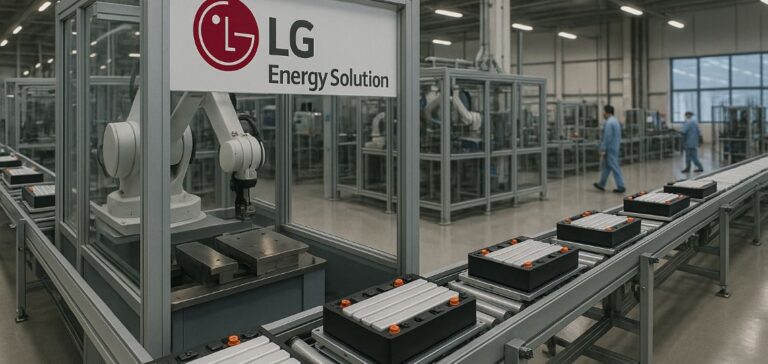South Korean group LG Energy Solution, one of the world’s leading producers of lithium-ion batteries for electric vehicles, has formalised the creation of a joint venture with French company Derichebourg, specialised in recycling and environmental services. The announcement was made by Derichebourg in a statement published on Monday.
The joint venture plans to build a recycling plant in Bruyères-sur-Oise, in the Val-d’Oise department, north of Paris. Construction work is scheduled to begin in 2026, with commissioning expected in 2027. According to Derichebourg, the plant will have a processing capacity of more than 20,000 tonnes per year.
Objective: securing supply of recycled materials
Derichebourg specified that one of the main missions of the new facility will be to recycle production scraps from LG Energy Solution’s plant located in Poland. This initiative is part of an industrial strategy aiming to secure the supply of strategic raw materials while anticipating changes in European regulations.
From 2031, the European Union will require a minimum level of recycled content in batteries placed on the European market. Derichebourg stated that this partnership will allow an effective response to these future requirements. “This collaboration enables us to secure a stable and financially competitive supply of recycled materials,” said Chang Beom Kang, Chief Commercial Officer of LG Energy Solution, quoted in the statement.
A market still developing in Europe
To date, the number of battery recycling plants remains limited in Europe due to currently low demand. The LG Energy Solution and Derichebourg project comes at a time when needs are expected to grow with the increase of electric vehicles on the road and upcoming legislative constraints.
LG Energy Solution already collaborates with several major international car manufacturers, including Stellantis, Toyota, Hyundai and Honda. Meanwhile, Derichebourg recorded a turnover of €3.6bn ($3.86bn) in 2024, mainly from its recycling activities, household waste management and urban cleaning services.





















